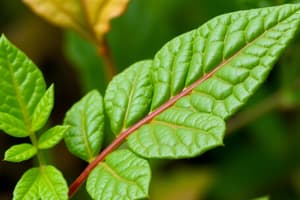Podcast
Questions and Answers
What scientific discipline focuses on interactions among organisms and their environment?
What scientific discipline focuses on interactions among organisms and their environment?
- Genetics
- Ecology (correct)
- Zoology
- Botany
What did Robert Hooke's discovery of cells in the 17th century contribute to?
What did Robert Hooke's discovery of cells in the 17th century contribute to?
- Medicine
- Chemistry
- Plant Cell Biology (correct)
- Physics
Which of the following is NOT an example of a microbe that plants engage in a symbiotic relationship with?
Which of the following is NOT an example of a microbe that plants engage in a symbiotic relationship with?
- Nitrogen-fixing bacteria
- Beneficial soil microbes
- Mycorrhizal fungi
- Parasitic worms (correct)
What does the concept of allostatic load introduced by Bruce McEwen help us understand?
What does the concept of allostatic load introduced by Bruce McEwen help us understand?
What do ecological interactions among animals involve?
What do ecological interactions among animals involve?
Which discipline provides a unifying framework for understanding life on Earth?
Which discipline provides a unifying framework for understanding life on Earth?
What does ecology illuminate according to the text?
What does ecology illuminate according to the text?
Flashcards are hidden until you start studying
Study Notes
Ecology and Biology: A Deeper Look
Biology, the study of living organisms, encompasses a wide range of fields, including ecology, the scientific discipline that focuses on interactions among organisms and their environment. Ecology's insights into the complex interplay of life forms and abiotic elements have evolved to address a multitude of questions shaping our understanding of the natural world.
Plant Cell Biology's Foundations
The field of plant cell biology, tracing back to Robert Hooke's discovery of cells in the 17th century, has provided a solid foundation for ecology. As we've grown to understand the basic structures and functions of plant cells, we've also come to appreciate the intricate relationships these organisms maintain with their environment.
The Microcosm: Plant-Microbe Interactions
Plants engage in a symbiotic relationship with microbes, such as nitrogen-fixing bacteria, mycorrhizal fungi, and beneficial soil microbes. These interactions are crucial to plant health and ecosystem function. For example, some plants produce reactive oxygen species to control the production of nitrogen, thus influencing the balance of nutrients in their environment.
Animal Communities
Ecological interactions among animals are equally diverse and complex. The struggle for resources can lead to competition, while predation and mutualism create a dynamic web of relationships.
The Human Perspective
Ecology's insights are not confined to the natural world. The concept of allostatic load introduced by Bruce McEwen demonstrates that the human body is a biological grindstone responding to environmental stressors. This concept has helped us understand the far-reaching physiological effects of stress and inequality.
The Macro and Microenvironment
Ecology is a discipline that spans both broad and intimate scales. From the global patterns of plant and animal distribution to the molecular interactions of plant cells, ecology provides a unifying framework for understanding life on Earth.
In conclusion, ecology offers a wide-ranging perspective on life and its interactions with the environment, both physical and societal. By shedding light on the complex relationships among organisms and their environments, ecology has illuminated the beauty and intricacy of life on our planet.
Studying That Suits You
Use AI to generate personalized quizzes and flashcards to suit your learning preferences.




